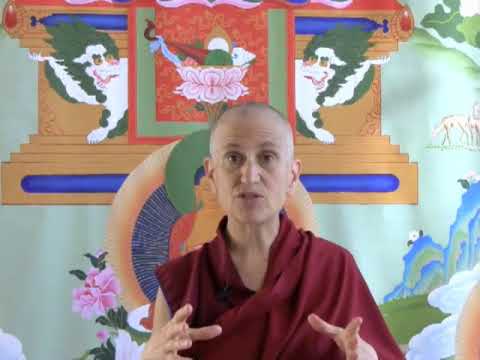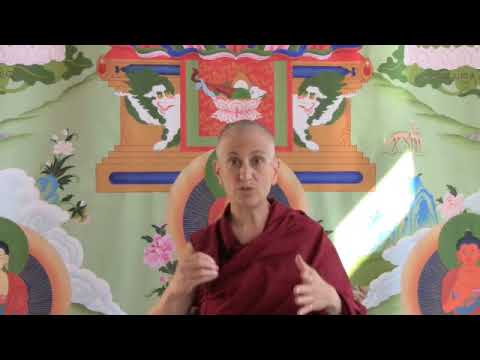Revelatory and non-revelatory forms
Part of a series of Bodhisattva's Breakfast Corner talks on the Stages of the Path (or lamrim) as described in the Guru Puja text by Panchen Lama I Lobsang Chokyi Gyaltsen.
- Actions that reveal the intention of the person acting
- Karma as the mental factor of intention
One last bit about karma is there’s talk of revelatory and non-revelatory forms when we speak of karma. Revelatory means an action that reveals the intention of the person who’s doing it and non-revelatory means it does not reveal the intention of the person who’s doing it. All the Buddhist schools agree that karma is the mental factor of intention. You have to have that mental factor of intention, that’s what karma is. Then the question comes, well what about the actual physical or verbal action, what are they? They aren’t intentions. So then here’s where we have the thing of revelatory and non-revelatory forms.
When you do a physical action, the motivation, the mental factor of intention, is the karma, one aspect of it, but then the action itself is revealing that intention. If you’re killing, it’s revealing the intention. If you’re protecting life, it’s revealing your intention. So the action itself is a form, it’s a revelatory form, that reveals the intention so that other people see it. And in the terms of verbal actions, the revelatory form is the sound of your voice.
There’s also this other thing called non-revelatory forms which is a very subtle kind of form that one assumes, for example, when one receives precept, and this non-revelatory form acts like a dam that keeps you from doing that action that you’ve decided you don’t want to do. So it’s the non-revelatory form is not perceivable by the eyes and it’s not obstructable, so it’s a very subtle kind of form and it’s asserted only by the Vaibhashika and the Prasaṅgika schools. I’ll talk tomorrow a little bit more about what non-revelatory form is and the different kinds, but those are the things that are involved when we take precepts because you’re walking around all day and you have the precepts but nobody can see your intention, can they? The precept is a kind of non-revelatory form. To be continued.
Venerable Thubten Chodron
Venerable Chodron emphasizes the practical application of Buddha’s teachings in our daily lives and is especially skilled at explaining them in ways easily understood and practiced by Westerners. She is well known for her warm, humorous, and lucid teachings. She was ordained as a Buddhist nun in 1977 by Kyabje Ling Rinpoche in Dharamsala, India, and in 1986 she received bhikshuni (full) ordination in Taiwan. Read her full bio.


